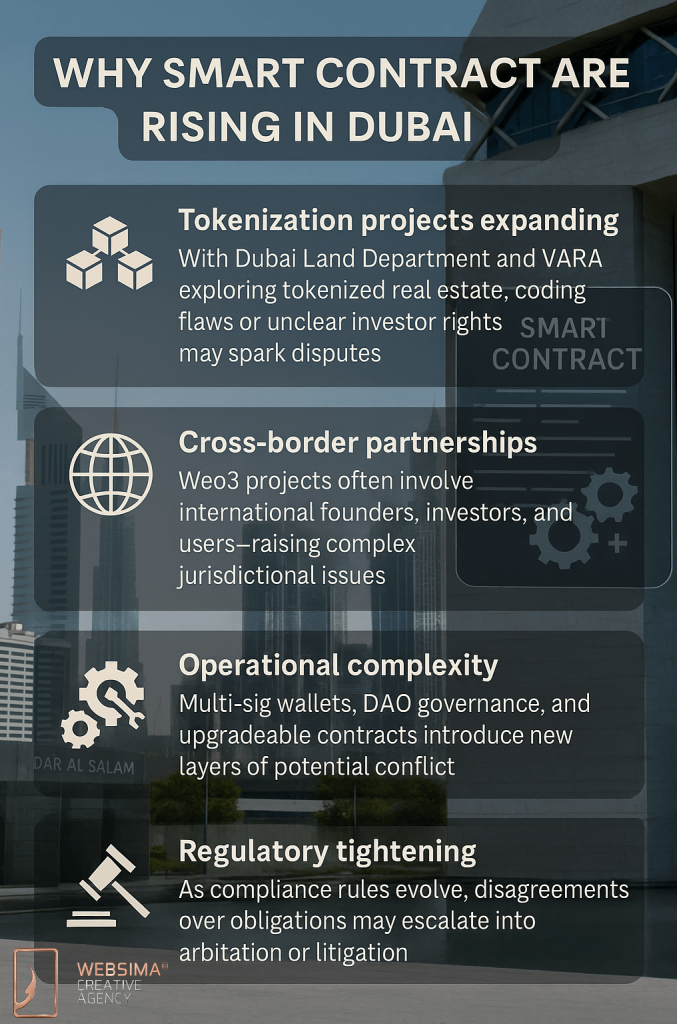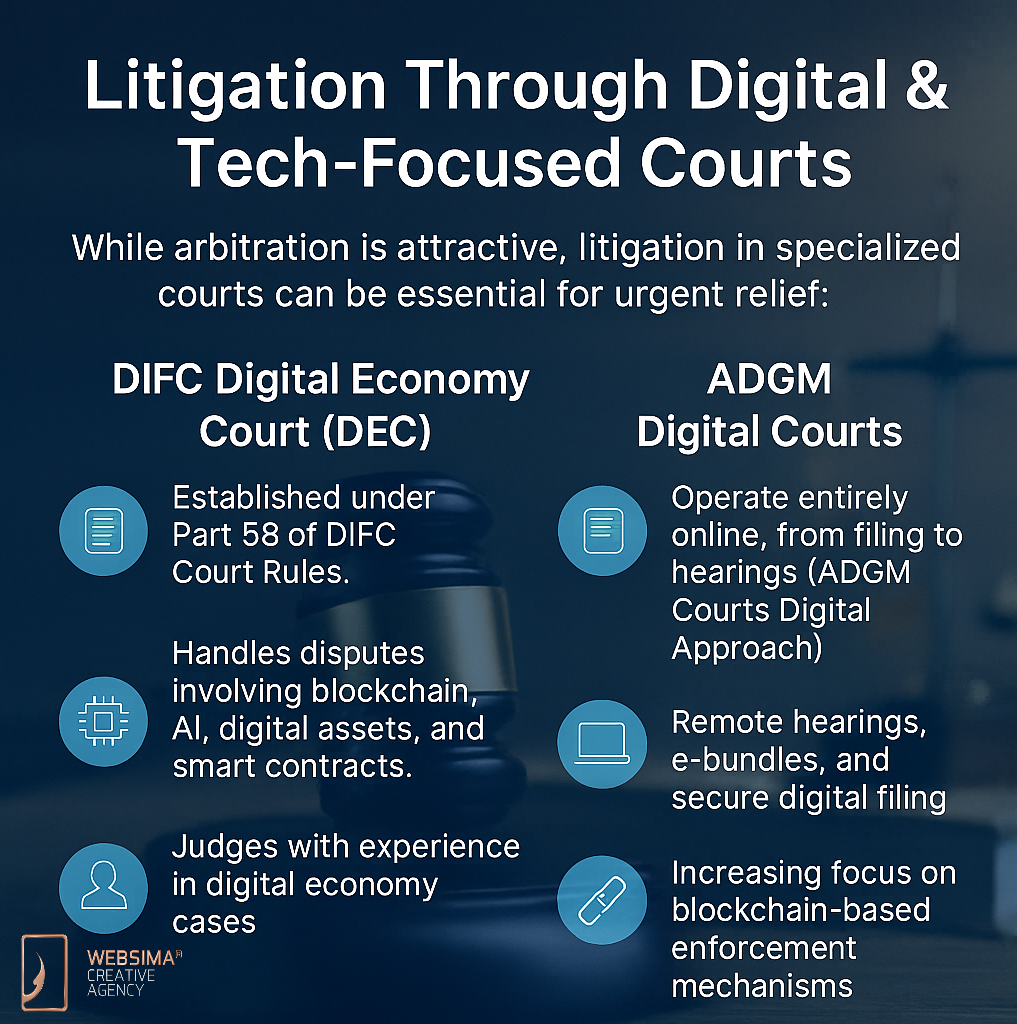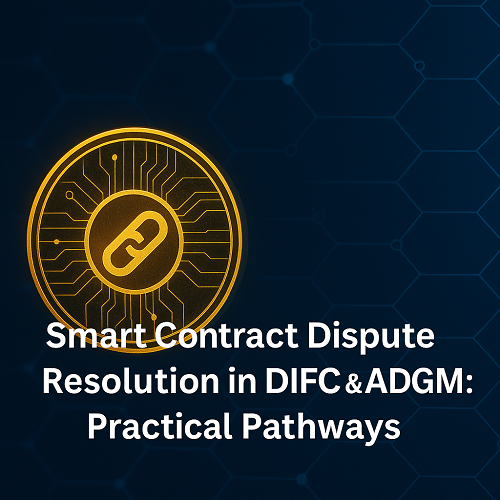Table of Contents
- Introduction
- Why Smart Contract Disputes Are Rising in Dubai
- DIFC vs ADGM: Legal Frameworks at a Glance
- Arbitration as a Primary Pathway
- Litigation Through Digital & Tech-Focused Courts
- Hybrid and Multi-Tier Dispute Resolution Clauses
- Evidence, E-Signatures & Code Interpretation
- Case Study: Tokenized Real Estate Dispute in DIFC
- Benefits of Choosing DIFC and ADGM for Smart Contract Disputes
- Risks and Challenges to Consider
- Common Mistakes to Avoid
- Fees and Cost Structures
- Outlook: 2025–2028 Trends in Dispute Resolution
- FAQs
- Final Thoughts
- Work with Websima
Introduction
Smart contracts have become the backbone of blockchain-powered innovation in Dubai—from tokenized real estate and decentralized finance (DeFi) platforms to cross-border settlement systems. But as adoption grows, smart contract disputes Dubai are becoming inevitable. When code executes in unexpected ways, when oracle security in Dubai fails, or when governance decisions clash with contractual expectations, investors and entrepreneurs need reliable legal frameworks.
This is where Dubai’s two common law jurisdictions—the Dubai International Financial Centre (DIFC) and the Abu Dhabi Global Market (ADGM)—play a decisive role. Both provide internationally recognized legal systems, arbitration regimes, and specialized courts built to handle digital disputes.
Dubai’s getting serious about $HBAR
Last year we saw DIFC Courts had selected Hedera for building their digital inheritance & wills platform.
That was a HUGE first step
But now DIFC Courts’ going beyond inheritances.
In fact this ties directly to the UAE Prime MInister &… pic.twitter.com/AhWjvZX8lP
— Tokenicer✲⥃⬢ (@Tokenicer) September 18, 2025
In this article, we explore the practical pathways to resolve smart contract disputes in DIFC and ADGM, compare arbitration and litigation options, highlight evidence issues, and assess the future outlook.
Why Smart Contract Disputes Are Rising in Dubai
Several factors are driving an increase in blockchain-related conflicts:

- Tokenization projects expanding: With Dubai Land Department and VARA exploring tokenized real estate, coding flaws or unclear investor rights may spark disputes.
- Cross-border partnerships: Web3 projects often involve international founders, investors, and users—raising complex jurisdictional issues.
- Operational complexity: Multi-sig wallets, DAO governance, and upgradeable contracts introduce new layers of potential conflict.
- Regulatory tightening: As compliance rules evolve, disagreements over obligations may escalate into arbitration or litigation.
Dubai’s DIFC and ADGM stand out because they are common law islands in a civil law country, offering English-language proceedings and alignment with international arbitration standards.
DIFC vs ADGM: Legal Frameworks at a Glance
| Feature | DIFC | ADGM |
| Arbitration | Governed by DIFC Arbitration Law, based on UNCITRAL Model Law | Governed by ADGM Arbitration Regulations 2015 (consolidated 2020) |
| Courts | DIFC Courts, with Digital Economy Court (DEC) specialized in blockchain/AI disputes (DEC Rules, Part 58) | ADGM Courts, operating entirely through digital infrastructure (ADGM Digital Courts) |
| Focus Areas | Contract disputes, tokenization cases, DeFi platform conflicts, digital asset enforcement | Financial disputes, trading disputes, on-chain/off-chain contract enforcement |
Both jurisdictions provide enforceability through the New York Convention, meaning arbitration awards can be recognized internationally.
Arbitration as a Primary Pathway
Arbitration is often the default mechanism for resolving smart contract disputes Dubai, for several reasons:
- International enforceability: Both DIFC and ADGM awards are enforceable globally under the New York Convention.
- Confidentiality: Sensitive code, financial arrangements, and governance matters can be resolved without public exposure.
- Expert selection: Parties can appoint arbitrators with blockchain or fintech expertise.
- Flexibility: Arbitration rules allow virtual hearings, expedited processes, and tailored procedures.
- DIFC Arbitration Law (2008, as amended 2013): Provides robust powers for tribunals to grant interim relief and recognizes electronic agreements.
- ADGM Arbitration Regulations 2015: Flexible, modern rules aligned with UNCITRAL principles.
- Institutional option: Parties can use the DIAC Arbitration Rules 2022, which allow expedited proceedings and virtual hearings.
Clause tip:
“Any dispute arising from or related to this Agreement, including disputes involving on-chain components and associated smart contracts, shall be finally resolved by arbitration seated in the DIFC (or ADGM), administered under DIAC Rules, with English as the language of proceedings.”
Litigation Through Digital & Tech-Focused Courts
While arbitration is attractive, litigation in specialized courts can be essential for urgent relief:

DIFC Digital Economy Court (DEC)
- Established under Part 58 of DIFC Court Rules.
- Handles disputes involving blockchain, AI, digital assets, and smart contracts.
- Judges with experience in digital economy cases.
ADGM Digital Courts
- Operate entirely online, from filing to hearings (ADGM Courts Digital Approach).
- Remote hearings, e-bundles, and secure digital filing.
- Increasing focus on blockchain-based enforcement mechanisms.
Litigation is particularly useful when parties need injunctions to freeze crypto assets or declaratory relief to interpret contractual terms.
Hybrid and Multi-Tier Dispute Resolution Clauses
Many Web3 contracts now adopt multi-tier mechanisms:
- Good faith negotiation (7–14 days).
- Mediation, if possible.
- Arbitration as the final step.
- Litigation in DIFC/ADGM courts for interim relief.
This hybrid model balances flexibility with enforceability, ensuring urgent measures can be obtained quickly while the core dispute proceeds confidentially in arbitration.
Evidence, E-Signatures & Code Interpretation
Smart contract disputes often hinge on digital evidence:
- Code as contract terms: Arbitrators and judges may rely on expert witnesses to interpret Solidity or Vyper code.
- Oracle failures: Clauses should specify backup data sources.
- E-signatures: DIFC recognizes electronic signatures and digital records under its Electronic Transactions Law.
- Forensic blockchain analysis: Courts and arbitrators accept analytics from explorers and smart contract auditors in Dubai.
Well-drafted contracts include hashes of deployed smart contracts in appendices, ensuring the correct code version is identified.
Case Study: Tokenized Real Estate Dispute in DIFC
Imagine a Dubai-based startup tokenizing residential apartments through fractional tokens. Two groups of investors disagree:
- Group A claims token holders should have voting rights over property management.
- Group B argues the whitepaper and SHA assign all management rights to the operator.
When the operator unilaterally upgrades the smart contract to alter rental distribution, disputes erupt.
The parties had chosen DIFC-seated arbitration under DIAC Rules. Arbitrators brought in a blockchain forensic expert to:
- Examine the original smart contract code.
- Compare deployed bytecode against whitepaper promises.
- Determine if the operator’s upgrade exceeded contractual powers.
The tribunal ruled partially in favor of investors, requiring operator compensation and clarifying voting thresholds.
Lesson: Clear governance clauses, code references, and dispute mechanisms are critical for tokenized projects.
Benefits of Choosing DIFC and ADGM for Smart Contract Disputes
- Global credibility: International recognition of awards and judgments.
- Tech-friendly courts: Digital-first infrastructure in both DIFC and ADGM.
- Flexibility: Arbitration, litigation, or hybrid pathways available.
- Expertise: Access to arbitrators, judges, and experts with blockchain knowledge.
- Investor confidence: Clear legal recourse encourages investment in Web3 projects.
Risks and Challenges to Consider
- Regulatory uncertainty: Smart contracts often involve evolving legal frameworks.
- Liquidity issues: Freezing crypto assets can be technically complex.
- Interpretation gaps: Translating code into legal obligations requires specialized experts.
- Enforcement costs: Cross-border enforcement can be expensive.
Common Mistakes to Avoid
- No governing law clause—leaving disputes open to multiple jurisdictions.
- Overreliance on “code is law”—ignoring the need for written legal agreements.
- Unclear arbitration seat—failure to specify DIFC or ADGM leads to disputes about jurisdiction.
- Ignoring oracle or fork risks—contracts should plan for contingencies.
- Weak interim relief planning—not drafting for urgent injunctions in court.
Fees and Cost Structures
- Arbitration: Costs include arbitrator fees, institutional fees, and expert costs. DIAC offers expedited procedures to reduce expense.
- Litigation: Filing fees in DIFC and ADGM are relatively predictable; digital processes reduce overheads.
- Practical tip: Use tiered dispute resolution to limit exposure—negotiate first, arbitrate when unavoidable.
Outlook: 2025–2028 Trends in Dispute Resolution
- Deeper specialization: Digital Economy Courts will expand rules tailored to blockchain disputes.
- Tech-savvy arbitrators: Institutions will build panels of blockchain experts.
- Regulatory alignment: VARA and FSRA will integrate dispute resolution into compliance regimes.
- On-chain evidence management: Expect more use of blockchain itself as an evidence repository.
- Cross-border enforcement improvements: ADGM Courts are piloting blockchain-based enforcement of judgments.
FAQs
- What are smart contract disputes Dubai most often about?
They typically involve disagreements over code execution, governance rights, or asset transfers linked to blockchain contracts. - Is arbitration better than litigation?
Arbitration provides confidentiality and enforceability, but litigation is useful for urgent interim relief. - Do DIFC and ADGM recognize electronic evidence?
Yes. Both accept electronic signatures, blockchain records, and digital submissions. - What law should I choose for smart contracts in Dubai?
Either DIFC law or ADGM law, but always specify one jurisdiction and arbitration seat. - Can crypto assets be frozen during disputes?
Yes, courts can issue injunctions, but effectiveness depends on identifying custodians or wallet providers.
Final Thoughts
Smart contract disputes Dubai are inevitable as blockchain adoption accelerates. Choosing the right forum—DIFC or ADGM—ensures access to expert arbitrators, tech-friendly courts, and internationally enforceable outcomes. By drafting clear dispute resolution clauses and planning for forks, oracle failures, and upgrade risks, businesses can turn potential crises into manageable events.
Work with Websima
At Websima, we help Web3 startups, investors, and enterprises design dispute-proof smart contract ecosystems. Our team provides:
- Contract architecture aligned with DIFC and ADGM law.
- Custom arbitration clauses that address forks, oracles, and admin keys.
- Litigation strategies for Digital Economy Courts and ADGM Courts.
- Rapid-response playbooks for asset freezes and incident investigations.
- Training workshops for legal, product, and developer teams.
Ready to safeguard your Web3 venture? Contact Websima today to explore tailored strategies for dispute resolution in Dubai’s most advanced legal hubs.





